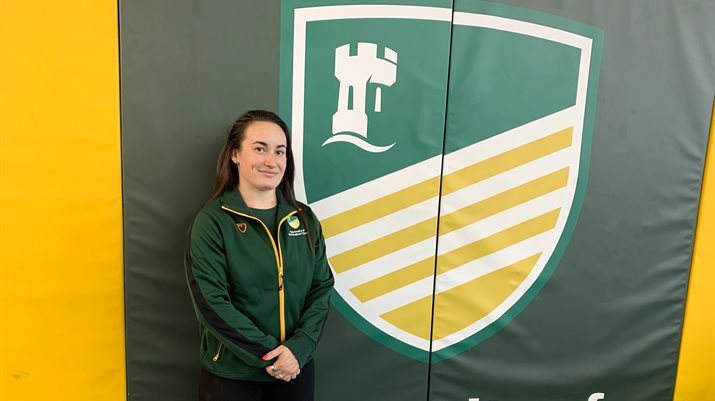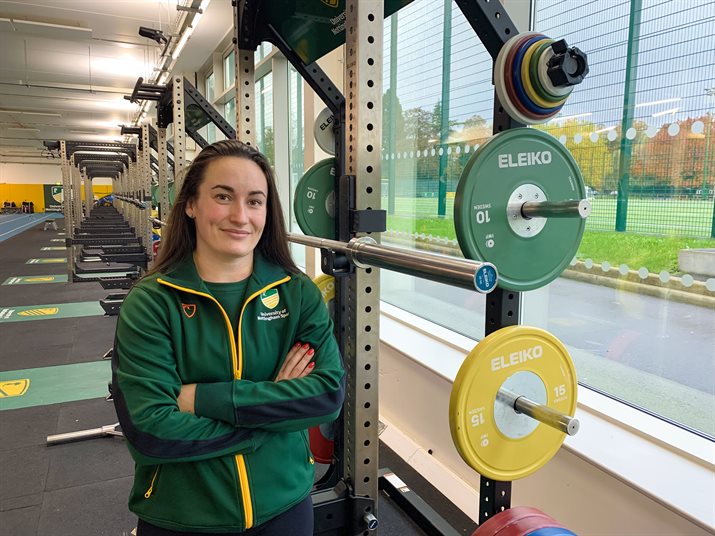
Sarah Davies is a Commonwealth gold medallist and is looking ahead to the 2024 Olympic Games next summer. Sarah is building up to the games and her qualification events by combining her training and competition with a master’s degree at the University of Nottingham. We recently spoke to Sarah to find out more.
Fantastic to speak with you today Sarah. Firstly, how did you get into your sport to begin with?
So I began weightlifting in 2011 at the age of 19. I found the sport when I was studying for my undergraduate degree in Leeds. At the time, the national training centre for British Weight Lifting was based there, and I ended up making friends with a few of the weightlifters who were training regularly and they ended up introducing me to the sport.
What was it about the sport that you enjoyed?
I’ve always been sporty – I did gymnastics as a kid to a high level, but stopped around the age of 14. I tried a few other sports such as golf after that, but I never really found anything that I enjoyed as much as gymnastics. I’d gone from training 27 hours a week as a gymnast to suddenly having a lot of free time. I managed to get back to gymnastics a little bit when I went to university for my undergrad, but that was more recreational alongside going to the gym regularly.
However, once I’d started weightlifting I loved that it was so measurable. Once I’d started to train properly I could see the progression with my body composition, as well as being able to continually feel myself lifting more weight and improving technique. I love competing and enjoy testing myself so that was a big part of me diving into the sport.
When did you realise that you had the ability to progress towards the top level as a weightlifter?
I started the sport in the September of 2011, and went into my first competition two months later in the November. At the time weightlifting wasn’t as big a sport as it is now, and I managed to qualify for the English Championships with the lifts from that very first competition. So, by the February of 2012 I was headed to Nationals and it was a bit of a whirlwind introduction to the sport.
A few months after that the British Championships rolled around as a qualifying event for the London 2012 Olympics. I was competing against Zoe Smith and Emily Muskett - who would be my teammates for the Tokyo Olympics – and we finished as the top three at the event. That gave me some confidence as I could begin to see that I wasn’t too far behind the top lifters in Britain. I hadn’t been training that long and it was cool to be a part of such a big event for the first time. After that I thought – you know what, I could give this a go.
I always thought that I could achieve something, but in gymnastics it requires the mind-set so young and I didn’t have it at that time. However, I feel I learnt from that and could apply certain things when I went into weightlifting.
You’ve taken that and gone on to achieve great things in your career so far, could you talk us through some of the stand-out moments?
Sure – I was a Team GB athlete at the 2020 Tokyo Olympics and was very close to winning a medal. I had the weight on the bar but it just wasn’t meant to be. I’ve also competed at three Commonwealth Games, winning gold at the 2022 Birmingham games, going one better than the silver I won in the Gold Coast in 2018. It was really nice to win in Birmingham in front of a full home crowd that created a huge atmosphere, particularly when there was no crowd in Tokyo! I think the environment of Birmingham and being in front of full crowds will help as I hopefully head into Paris. I also won a World Championship silver in 2021 to go with a silver in the Europeans in the same year, so the last few years have been fairly successful. The growth of women’s weightlifting in the last few years has seen the standard continually rise, and the competition at the moment is unbelievable because the participation has grown so much. To see the shift from previous stigmas in women’s weightlifting to the environment it has now is incredible.
Have you always been competitive and had a drive to compete against others and yourself?
My dad is competitive and used to race motorbikes, and my brother is a golf pro so there is a competitive side in the family which I’ve also always had. I’ve always wanted to keep on pushing my abilities and the heights I can achieve. Sometimes that can be a bit detrimental if I’m not careful. My coaching team are good at reigning me back in sometimes and making sure that I’m being a bit kinder to myself. I can sometimes expect too much of myself so I have to make a conscious effort to keep the balance right.
Does that competitive aspect and drive exist in other areas such as your academics?
Yes, definitely. I’m here at the University of Nottingham getting back into studying ten years after I finished my undergraduate degree because I want to be better and have a greater chance of success in my career when I finish my sport. I’m very thankful to my parents for giving me the focus on my academics too because an athletic career can always end in a flash.
Before I fully launched into weightlifting, I actually did some teaching because that was what I studied for my undergraduate degree. However, as a PE teacher, my timetables just couldn’t co-exist because school holidays don’t match with competition times so I took the leap to become a full-time athlete alongside a coaching business.
Looking ahead, I haven’t put an end date on my competitive weightlifting but I am starting to think about the transition into a different career. I’m studying a masters in International Business at the University of Nottingham and that will ensure I’m ready for what’s next when I know that the time is right to finish weightlifting.
I’ve worked with national governing bodies over the last twelve years, so being able to study wider aspects of business and not just within sport should hopefully provide me with a broader amount of knowledge, provide a challenge for me, and also give me greater career options outside of sport if that’s something I look to pursue.
It sounds like you’ve got a good plan for your longer term aspirations, what are your aims in the shorter term?
The next big thing for me is qualification for the 2024 Paris Olympics next summer. We’re in the middle of the process now, with last year’s World Championships kicking off the cycle of qualification competitions. It’s going okay so far - I just need to keep putting the numbers on the board. There are three competitions left, with two world competitions and a European Championships coming up. I think I’ve started to look at Paris and the World Championships in 2024 as my next two serious goals in weightlifting, and then my priorities might shift into academics and the next part of my career away from weightlifting.
How did you come to the decision to become a student athlete again in an Olympic year?
I’ve been toying with the idea of studying for a Masters since before Covid, but that then sent everything upside down. For me it was a case of – if I can study part-time, I want to do it now because then it allows for that gradual shift. I can focus in on Paris, but also get started with the academics again and I’m thankful to the University of Nottingham for the opportunity to do that. The studying also provides a bit of relief from the training! I’ve found that constantly jus focussing on my athletic goals can be a struggle for my mental health. If you have a bad session then you stew on it until the next session, but having something else to focus on outside of the sport has been really nice for me.
With British Weight Lifting now based here at the University of Nottingham, was it a fairly easy decision to study here too?
It definitely was, yes. During coronavirus, we were able to continue training here as a squad – particularly myself and Emily Campbell. I’ve then trained here for the last twelve months as part of the GB squad through their partnership with UoN Sport, and as a result I’ve got friends that I train with in the HPZ who are also sport scholars. You see the support that they’ve received as a sport scholar at the university and when you combine that with the fact that it’s also a university with a fantastic business school, it just seemed that everything lined up and I had to take the opportunity.
How have you found settling back into university life now that you’ve been a student here for a short while?
It’s definitely been an adjustment! As I mentioned, it’s been a while since I graduated for my undergraduate degree but I’ve been getting into the swing of things fitting my training around my studies. Thankfully my timetable fits perfectly around my training schedule so it’s been a good adjustment. Having the opportunity to make new relationships with different people such as scholars from different sports who understand the demands of studying and training has been also been a great support too.
With the experience you have and as a Greenaway scholar, have you been able to pass on advice to other sport scholars?
I try to fly a little under the radar, but I do have the Olympic Rings tattoo so some will see that and spark some conversation around that which for me is really nice. It’s cool to be able to offer support to others who are also from different sports striving to achieve that experience. Previously I’ve predominantly trained individually, so to train in the High Performance Zone environment with other high achieving athletes is really engaging.

We thank Sarah for her time and wish her all the best with her training and future competitions which we hope will include the 2024 Olympic Games, as well Sarah’s future career aspirations.
You can find out more about sport scholarships at the University of Nottingham here, as well as discover more about our Performance Badminton programme here.
Posted on Tuesday 7th November 2023